
Loup Garou is an album released in 1995 by Willy DeVille. First released in Europe in 1995 on the EastWest label, it was released the following year in the United States on the Discovery label. It was recorded in Los Angeles and produced by John Philip Shenale, who also produced DeVille’s Backstreets of Desire album.

Willy DeVille was an American singer and songwriter. During his thirty-five-year career, first with his band Mink DeVille (1974–1986) and later on his own, DeVille created original songs rooted in traditional American musical styles. He worked with collaborators from across the spectrum of contemporary music, including Jack Nitzsche, Doc Pomus, Dr. John, Mark Knopfler, Allen Toussaint, and Eddie Bo. Latin rhythms, blues riffs, doo-wop, Cajun music, strains of French cabaret, and echoes of early-1960s uptown soul can be heard in DeVille's work.

Edwin Joseph Bocage, known as Eddie Bo, was an American singer and pianist from New Orleans. Schooled in jazz, he was known for his blues, soul and funk recordings, compositions, productions and arrangements. He debuted on Ace Records in 1955 and released more single records than anyone else in New Orleans other than Fats Domino.
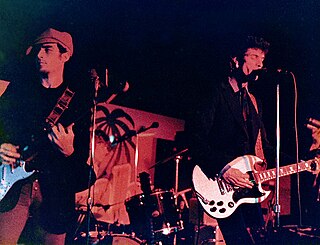
Mink DeVille was a rock band founded in 1974, known for its association with early punk rock bands at New York's CBGB nightclub and for being a showcase for the music of Willy DeVille. The band recorded six albums in the years 1977 to 1985, after which it disbanded the next year. Except for frontman Willy DeVille, the original members of the band played only on the first two albums. For the remaining albums and for tours, Willy DeVille assembled musicians to play under the name "Mink Deville". After 1985, when Willy DeVille began recording and touring under his own name, his backup bands were sometimes called "The Mink DeVille Band", an allusion to the earlier Mink Deville name.
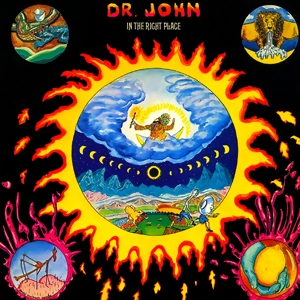
In the Right Place is the sixth album by the New Orleans R&B artist Dr. John. The album was released on Atco Records in 1973, and became the biggest selling album of Dr. John's career.

Leo Nocentelli is an American musician and songwriter best known as a founding member and lead guitarist of the funk band the Meters. He wrote the original versions of several funk classics such as "Cissy Strut" and "Hey Pocky A-Way". As a session musician he has recorded with a variety of notable artists such as Dr. John, Robert Palmer and Etta James. He is the recipient of a Grammy Lifetime Achievement Award as a member of the Meters.

Coup de Grâce is the fourth album by the rock band Mink DeVille, released in 1981. The album represented a departure for the band, as frontman Willy DeVille dismissed the only other remaining original member of the band, guitarist Louis X. Erlanger, and hired Helen Schneider's backup band to record the album. Moreover, the album was recorded for Atlantic.
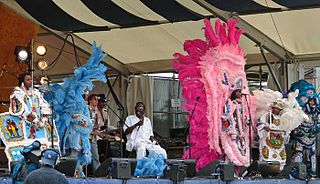
The Wild Magnolias are a Mardi Gras Indian tribe who also record and play as a funk musical act from New Orleans, Louisiana.
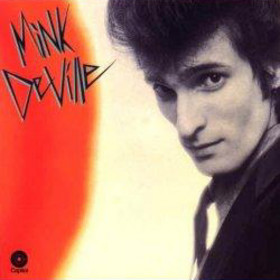
Cabretta, known as Mink DeVille in the United States, was the 1977 debut album by Mink DeVille. It peaked at number 186 on the Billboard 200 chart and was voted the 29th best album of 1977 in the Village Voice's Pazz & Jop critics' poll. A single from the album, "Spanish Stroll", was a top-20 hit in the UK.
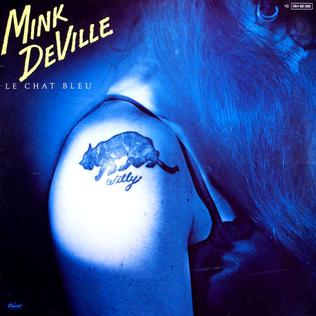
Le Chat Bleu is the third album by the rock band Mink DeVille, released in 1980. The album received critical acclaim and elevated lead singer and composer Willy DeVille to star status. The Rolling Stone critics' poll ranked Le Chat Bleu the fifth best album of 1980, and music historian Glenn A. Baker declared it the tenth best rock album of all time. The album cover is a photo of Willy's first wife Toots Deville's tattoo on her shoulder.
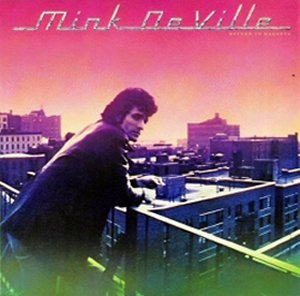
Return to Magenta, issued in 1978, is the second album by the rock band Mink DeVille. The album was the last to feature all the original members of the band. For this album the band was joined by Rock and Roll Hall of Fame member Steve Douglas on sax and Dr. John on piano, who would later collaborate with leadsinger Willy DeVille after his move to New Orleans.

Where Angels Fear to Tread is the fifth studio album by the rock band Mink DeVille. It was released in 1983, and was the second album Mink DeVille recorded for Atlantic Records, and Atlantic brought in two in-house producers, Howard Albert and Ron Albert, to produce the album.

Sportin’ Life is the sixth and final studio album by the rock band Mink DeVille, released in 1985. Since the band's third album, 1981's Le Chat Bleu, when the original members of the band departed, lead singer and composer Willy DeVille had been assembling musicians to record and tour under the name Mink DeVille. After Sportin’ Life, Willy DeVille began recording and touring under his own name.

Miracle is an album by Willy DeVille. Recorded in 1987, it was the first album that Willy DeVille recorded under his own name. Prior to Miracle, DeVille recorded six albums with the band Mink DeVille, the last four of which were really solo albums by Willy DeVille in that no members of the original band played on the four albums.
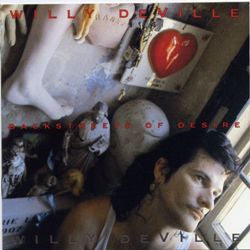
Backstreets of Desire is an album by Willy DeVille. It was recorded in various Los Angeles recording studios in 1992. To make the album, DeVille was joined by many prominent musicians, including Dr. John, David Hidalgo of Los Lobos, Zachary Richard, Jim Gilstrap, Freebo, Efrain Toro, and Jimmy Zavala.

Willy DeVille Live is a live recording of Willy DeVille and the Mink DeVille Band. It was recorded on June 16–17, 1993 at The Bottom Line in Greenwich Village, New York City, and in October 1993, at the Olympia Theatre in Paris. It was released in Europe on December 1, 1993 in Europe by the French label Fnac Music and re-issued in 2012 under title Live in Paris and New York.

Big Easy Fantasy is an album by Willy DeVille and the Mink DeVille Band. It was released in Europe on the French New Rose label in 1995. The album is a mixture of studio tracks and concert recordings made in New York and Paris. The "big easy" of the album's title refers to New Orleans. As the album cover says, the inspiration for the album was "Jump City, the Crescent City, the city that care forgot, New Orleans...The Big Easy!" All songs on the album are standards by New Orleans musicians or are original compositions by Willy DeVille about some aspect of New Orleans.
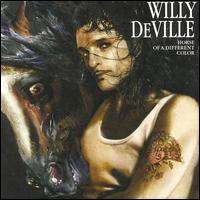
Horse of a Different Color is a 1999 album by Willy DeVille. The album consists of original compositions and remakes of traditional Black music titles such as Fred McDowell's “Going over the Hill,” and Andre Williams' "Bacon Fat."

Crow Jane Alley is an album by Willy DeVille. It was recorded in 2004 in Los Angeles. For this album, DeVille was joined by members of the Chicano rock band Quetzal, David Hidalgo of Los Lobos, and Peruvian Afro-Cuban jazz drummer Alex Acuña, among other prominent musicians. Crow Jane Alley was produced by John Philip Shenale, the third album Shenale produced for DeVille.

Pistola is the last album by Willy DeVille, released on Mardi Gras day 2008 as a nod to DeVille's musical roots in New Orleans. The album was recorded in Los Angeles with Brian Ray, Lon Price, The Valentine Brothers, and other musicians who had played with DeVille for years. For this album, DeVille borrowed bassist Davey Faragher and drummer Pete Thomas from Elvis Costello's backup band, the Imposters. John Philip Shenale produced the album, his fourth production effort for Willy DeVille.




















